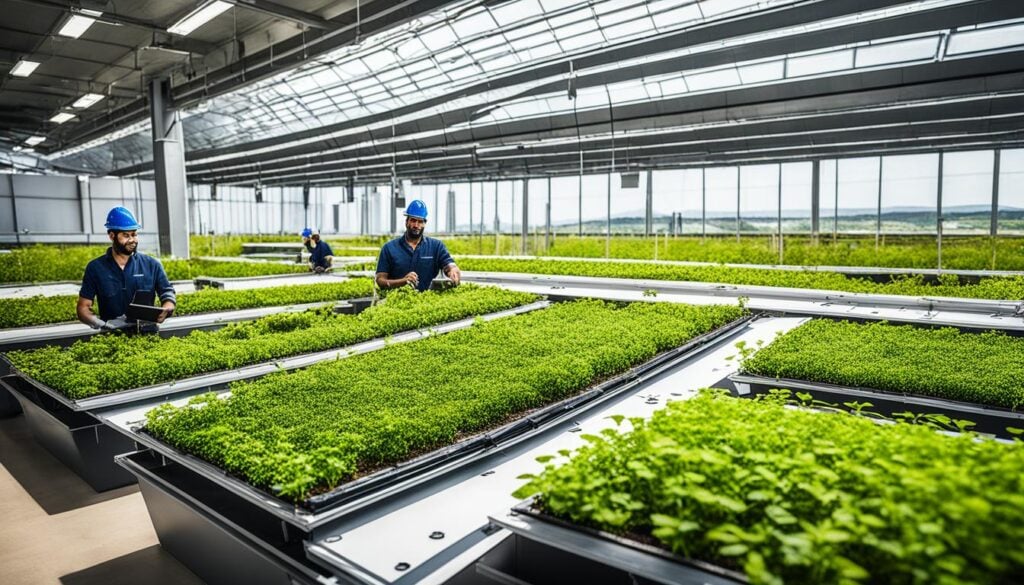Are you ready to join the movement towards sustainable manufacturing? As the world shifts towards eco-friendly production and green manufacturing practices, it’s crucial for Singaporean manufacturers to embrace sustainability in order to stay competitive and meet the growing demand for environmentally conscious products.
Sustainable manufacturing is about implementing responsible production practices that reduce the carbon footprint and minimize environmental impact. It involves adopting sustainable production solutions, embracing ecological manufacturing methods, and making conscious choices throughout the manufacturing process.
Singapore, known for its innovation and forward-thinking mindset, is taking the lead in promoting sustainability through initiatives like the Green Plan. This comprehensive action plan focuses on various aspects of sustainable manufacturing, including sustainable packaging, decarbonisation, waste upcycling, and water treatment solutions.
To thrive in this new era of manufacturing, it’s essential for businesses to commit to clear action and shift towards sustainability. By doing so, not only can you contribute to a greener future, but you can also reap the benefits of increased consumer demand for sustainable products.
In the following sections, we will dive deeper into the five key areas of impact for sustainable manufacturing. We will explore why product design, material selection and ethical sourcing, the factory of the future, shipping and distribution, and the circular economy are crucial components of a sustainable manufacturing strategy. We will also discuss Singapore’s thriving food technology sector and the role it plays in driving sustainability.
The Five Areas of Impact for Sustainable Manufacturing
To achieve sustainable manufacturing, it is crucial for manufacturers to drive improvements across various areas of their value chain. By focusing on these areas, businesses can make significant strides towards sustainable production practices, responsible manufacturing, and sustainable manufacturing solutions. Here are the five key areas of impact:
1. Product Design
Product design plays a critical role in sustainable manufacturing. By considering sustainability principles from the initial stage of product development, manufacturers can create eco-friendly and resource-efficient products. This involves optimizing raw material utilization, extending product lifecycles, and designing for reuse, refurbishment, or remanufacture. Implementing sustainable product design practices can not only reduce the environmental impact but also open up new revenue streams and maximize energy savings.
2. Material Selection and Ethical Sourcing
Responsible manufacturing requires careful consideration of material selection and ethical sourcing practices. Manufacturers should prioritize the use of sustainable materials and ensure transparent supply chains. By leveraging technologies like blockchain, it becomes easier to track and trace materials, ensuring their provenance and ethical sourcing. This not only helps meet consumer expectations for increased transparency but also enables efficient quality control and reduces the risk of tampering.
3. The Factory of the Future
Creating sustainable factories is crucial for reducing the carbon footprint of the manufacturing industry. Manufacturers can adopt renewable energy sources, implement energy-efficient technologies, and build net-zero buildings to minimize their environmental impact. By forging the factory of the future, businesses can significantly lower energy consumption, reduce costs, and achieve sustainability outcomes.
4. Streamlining Shipping and Distribution
Optimizing shipping and distribution practices is essential in sustainable manufacturing. By leveraging data analytics and innovative technologies, manufacturers can streamline their logistics operations, minimize fuel consumption, and reduce emissions. Analyzing delivery routes, optimizing packaging, and reducing idle time can result in more sustainable shipping practices while maintaining efficient supply chains.
5. Embracing a Circular Economy
Transitioning towards a circular economy is a key driver of sustainable manufacturing. By focusing on material reduction, reuse, recycling, and responsible disposal practices, manufacturers can minimize waste generation and maximize resource efficiency. Embracing a circular economy model not only reduces costs but also helps businesses comply with global regulations and enhance their environmental stewardship.
Product Design with Sustainability in Mind
When it comes to sustainability in manufacturing, product design plays a crucial role. By considering sustainability from the initial stages of product development, manufacturers can create products that align with their environmental goals and contribute to a more sustainable future.
One key aspect of sustainable product design is the utilization of raw materials. By optimizing the use of raw materials, manufacturers can reduce waste and lower their overall environmental impact. This not only helps to conserve valuable resources but also minimizes disposal costs.
Another important consideration in product design is the product lifecycle. Manufacturers should aim to extend the lifecycle of their products by designing them for reuse, refurbishment, or remanufacture. This approach not only reduces the need for new raw materials but also contributes to a circular use of resources.
By modifying existing products to incorporate sustainability principles, manufacturers can unlock new revenue streams. For example, offering repair or refurbishment services can provide additional income while reducing the environmental impact of discarded products.
In addition to revenue opportunities, product design with sustainability in mind can also lead to energy savings. By designing products that are more energy-efficient or that utilize renewable energy sources, manufacturers can reduce their carbon footprint and contribute to a greener future.
Overall, integrating sustainability into product design is essential for manufacturers looking to achieve their sustainability goals. By addressing factors such as raw material utilization, product lifecycle, and the circular use of raw materials, manufacturers can create products that are not only environmentally friendly but also economically viable in the long term.
Material Selection and Ethical Sourcing
As consumers become increasingly conscious of the environmental and social impact of their purchases, the demand for ethical sourcing and transparent supply chains has grown exponentially. In response to this demand, manufacturers are turning to innovative solutions, such as blockchain technology, to ensure the provenance of their materials and create a more sustainable value chain.
By leveraging blockchain technology, manufacturers can establish an immutable and transparent record of their supply chains. This allows for greater visibility into every step of the production process, from raw material extraction to manufacturing and distribution. With this level of transparency, consumers can be confident in the ethical sourcing of the products they purchase.
Blockchain technology provides a decentralized and secure platform for recording and verifying transactions. Each transaction or transfer of materials is recorded as a block, creating a chain of custody that is accessible to all stakeholders. This not only ensures the integrity of the supply chain but also allows for traceability in the event of recalls or quality issues.
One industry that has successfully implemented blockchain technology for ethical sourcing is the diamond industry. By utilizing a global diamond ID system, manufacturers can track the journey of each diamond, providing customers with proof of its ethical sourcing. This helps to combat issues such as conflict diamonds and provides assurance of responsible practices.
The benefits of adopting blockchain technology for ethical sourcing are numerous. Beyond meeting consumer expectations, manufacturers can reduce the risk of counterfeit materials, improve supply chain efficiency, and minimize the environmental impact associated with unsustainable sourcing practices.
As the push for sustainability and ethical practices continues to shape the manufacturing industry, material selection and ethical sourcing are essential components of the journey towards a more responsible and transparent supply chain. By embracing blockchain technology and ensuring the provenance of materials, manufacturers can build trust with consumers and contribute to a more sustainable future.
Forging the Factory of the Future
Manufacturers today are increasingly recognizing the importance of embracing sustainability in their operations. By focusing on energy usage in factories, companies can not only achieve their sustainability goals but also significantly reduce costs. Implementing sustainable practices in factories promotes environmental stewardship and aligns with Singapore’s commitment to a greener future.
One key aspect of sustainable factories is the use of renewable energy sources. By harnessing the power of solar, wind, or hydroelectric energy, manufacturers can reduce their reliance on fossil fuels and lower their carbon footprint. Renewable energy sources provide a clean and sustainable alternative, contributing to the overall energy efficiency of the factory.
In addition to utilizing renewable energy sources, energy-efficient technologies play a crucial role in the factory of the future. By investing in energy-efficient machinery and equipment, manufacturers can optimize energy consumption and minimize waste. From advanced control systems to energy-efficient lighting and heating systems, every aspect of the factory can be optimized for maximum energy efficiency.
Furthermore, building net-zero buildings is another step towards sustainable manufacturing. Net-zero buildings are designed to produce as much energy as they consume, resulting in a neutral environmental impact. These buildings are equipped with energy-efficient features, such as solar panels, efficient insulation, and smart systems that monitor and regulate energy usage. By constructing net-zero buildings, manufacturers not only reduce their carbon footprint but also benefit from long-term cost savings through reduced energy consumption.
Embracing sustainable manufacturing practices not only benefits the environment but also improves companies’ bottom line. By reducing energy consumption and operating costs, manufacturers can achieve financial savings while contributing to a greener future. Implementing renewable energy sources, adopting energy-efficient technologies, and constructing net-zero buildings are crucial steps towards forging the factory of the future.
Streamlining Shipping and Distribution
In the pursuit of sustainable manufacturing practices, optimizing shipping and distribution processes is crucial. By leveraging advanced technologies and data analytics, manufacturers can streamline their logistics operations for more efficient and environmentally friendly outcomes.
One vital aspect of optimizing distribution practices is analyzing delivery routes. By evaluating the most efficient paths for transporting goods, manufacturers can minimize fuel consumption and reduce their carbon footprint. Data analytics plays a significant role in this process, providing insights into traffic patterns, real-time road conditions, and other variables that can impact transportation efficiency.
In addition to route optimization, minimizing idle time is another key strategy for sustainable shipping and distribution. By utilizing data analytics, manufacturers can identify idle periods during transportation and implement measures to reduce them. This can include efficient scheduling, tracking and monitoring systems, and effective communication channels between drivers and control centers.
Reducing fuel consumption is also a critical aspect of sustainable shipping and distribution. By exploring alternative fuel options, implementing fuel-saving technologies, and adopting fuel-efficient driving techniques, manufacturers can significantly lower their overall fuel consumption. This not only reduces greenhouse gas emissions but also helps to minimize operational costs.
By embracing optimized distribution practices and leveraging data analytics, manufacturers in Singapore can achieve substantial improvements in their shipping and distribution processes. These enhancements not only contribute to the overall goal of sustainable manufacturing but also lead to cost savings and better customer satisfaction. With advances in technology and the increasing availability of data, companies have the opportunity to revolutionize their logistics operations and pave the way for a more sustainable future.
The Case for a Circular Economy
Embracing a circular economy can bring both environmental and financial benefits to manufacturers in Singapore. The circular economy model focuses on minimizing waste and maximizing resource efficiency throughout the product lifecycle.
One key aspect of a circular economy is material reduction. By designing products with a focus on reducing materials and optimizing resource consumption, manufacturers can minimize their environmental impact. This not only conserves valuable resources but also reduces production costs.
Another important principle of the circular economy is the reuse of materials. Rather than disposing of products or materials after use, manufacturers can find innovative ways to extend their lifespan. This can involve refurbishing, repurposing, or remanufacturing products to give them a second life. By adopting these practices, manufacturers can reduce the demand for new resources and decrease waste generation.
Recycling plays a crucial role in the circular economy. By implementing effective recycling programs, manufacturers can transform waste materials into valuable resources. This not only reduces the need for extracting virgin materials but also minimizes the volume of waste sent to landfills. Recycling promotes the concept of a closed-loop system where materials are continuously used and circulated within the economy.
Responsible disposal practices are also vital in the circular economy. Manufacturers must ensure that any materials or products that cannot be reused or recycled are disposed of properly. This involves adhering to strict regulations and utilizing appropriate waste management systems to prevent pollution and environmental harm.
By embracing a circular economy model, manufacturers in Singapore can enhance their sustainability efforts and contribute to a more environmentally responsible future. Material reduction, reuse, recycling, and responsible disposal practices can help manufacturers lower costs, comply with global regulations, and create a more circular and sustainable manufacturing sector.
The Journey towards Sustainable Manufacturing
When it comes to embracing sustainability in manufacturing, there is no one-size-fits-all solution. Each manufacturer must carefully consider their unique value chain and identify opportunities for measurable sustainability outcomes that create lasting social value. By doing so, manufacturers can align their manufacturing business models with the operational realities of sustainability and make a positive impact.
Embracing sustainability in manufacturing goes beyond just reducing environmental impact. It involves implementing sustainable production practices that consider social value, environmental stewardship, and economic viability. Manufacturers need to evaluate their processes, materials, and supply chains to ensure they are working towards sustainability outcomes that reflect their commitment to being responsible corporate citizens.
Manufacturers can start by exploring sustainable manufacturing solutions that align with their goals and values. This may involve adopting eco-friendly production techniques, integrating green manufacturing processes, and embracing responsible manufacturing practices. By prioritizing sustainability outcomes, manufacturers can make a tangible difference in their respective industries and contribute to a more sustainable future.
One aspect of sustainable manufacturing that deserves attention is social value. Manufacturers should strive to create products and services that not only meet customer needs but also contribute to society in a meaningful way. This can be achieved by promoting fair labor practices, supporting local communities, and giving back through corporate social responsibility initiatives.
The Impact of Sustainable Manufacturing
Sustainable manufacturing has the potential to yield numerous benefits in various aspects of the manufacturing process. Firstly, it can enhance resource efficiency, reducing waste and minimizing the use of raw materials. Secondly, it can optimize energy consumption, leading to lower operational costs and a reduced carbon footprint.
Sustainable manufacturing practices can also inspire innovation and drive product differentiation. By focusing on sustainable product design, manufacturers can create products that align with consumer demand for eco-friendly and socially responsible choices. This not only appeals to environmentally conscious consumers but also positions manufacturers as industry leaders in sustainability.
Furthermore, sustainable manufacturing can strengthen brand reputation and build customer loyalty. In an increasingly competitive market, consumers are drawn to companies that prioritize sustainability and demonstrate a commitment to creating positive social and environmental impacts.
Charting Your Path towards Sustainable Manufacturing
To embark on the journey towards sustainable manufacturing, each manufacturer must evaluate their current practices, engage stakeholders, and develop a clear roadmap for change. This involves assessing the environmental and social impacts of their operations, identifying areas for improvement, and setting measurable sustainability goals.
Collaboration and knowledge sharing within the industry are also pivotal for driving sustainable manufacturing forward. Manufacturers can learn from each other’s successes and failures, sharing best practices and collectively working towards a more sustainable future.
By adopting sustainable manufacturing practices, manufacturers can not only mitigate risks associated with environmental regulations and consumer demands but also create new opportunities for growth, efficiency, and social impact. Through their commitment to sustainability, manufacturers have the power to shape a better world for future generations.
Singapore’s Food Technology Sector Driving Sustainability
Singapore’s food technology sector is at the forefront of driving sustainability and promoting food security. With a focus on innovative methods and solutions, the sector is actively contributing to sustainable food production and addressing global challenges. Two key areas of growth and innovation within the sector are alternative proteins and upcycling.
Investments in alternative proteins have witnessed exponential growth in recent years. This emerging field offers sustainable solutions to meet the growing demand for protein-rich foods while reducing the environmental impact associated with traditional livestock production. Through technologies such as plant-based proteins, cultured meat, and insect proteins, Singapore’s food technology companies are providing consumers with alternative protein sources that are more efficient, environmentally friendly, and ethical.
In addition to alternative proteins, upcycling food waste has gained significant traction within the sector. Upcycling involves transforming food by-products and waste into high-value products, minimizing waste generation and maximizing resource utilization. By utilizing innovative technologies and processes, such as fermentation and bioconversion, food technology companies are creating new products and ingredients from food waste, contributing to a more sustainable and circular food system.
The adoption of food technology solutions in Singapore’s food industry not only reduces the reliance on traditional agricultural practices but also helps mitigate the impact of climate change, ensure food security, and promote sustainable consumption. Through collaboration between food technology innovators, local authorities, and research institutions, Singapore is becoming a hub for sustainable food production, attracting investments and fostering the development of a resilient and efficient food ecosystem.
Technological Advances and Food Sustainability
Technological advancements in food production have paved the way for sustainable solutions that contribute to a more environmentally conscious food system. Two notable innovations in this space are cultivated meat and upcycled foods.
Cultivated meat, also known as lab-grown meat or cultured meat, is produced through cell cultures rather than traditional animal farming. This revolutionary approach not only reduces the need for large-scale animal farming but also significantly lowers the associated environmental impacts. Cultivated meat production requires minimal land, as it eliminates the need for vast grazing areas, thereby conserving valuable natural resources.
Furthermore, cultivated meat production allows for precise control over the process, resulting in reduced production costs and a more efficient use of resources. With the advancement of technology, the taste, texture, and nutritional profiles of cultivated meat are continuously improving, making it an attractive and sustainable alternative to conventional meat products.
Another innovative area within food sustainability is the development of novel food products made from upcycled ingredients. Upcycling involves transforming food waste or by-products into new, nutritious food products. This approach not only reduces food waste but also maximizes the value extracted from the ingredients, contributing to a more circular and sustainable food system.
By incorporating upcycled foods into the culinary landscape, manufacturers can tap into new market opportunities while simultaneously addressing the pressing issue of food waste. This practice aligns with sustainability goals by minimizing the environmental impact associated with the disposal of food waste while maximizing the potential value derived from it.
Overall, these technological advances in food production, including cultivated meat and upcycled foods, provide promising avenues for achieving food sustainability. These innovations offer reduced production costs, minimal land requirements, and efficient resource utilization, which can greatly contribute to the global efforts to combat food waste and reduce the ecological footprint of the food industry.
Government Support for Sustainable Food Manufacturing in Singapore
Food manufacturers in Singapore are receiving valuable assistance from Enterprise Singapore in their sustainability journey. Recognizing the importance of sustainable food production, the government is committed to supporting the food industry in achieving its sustainability goals and contributing to the nation’s environmental objectives.
Enterprise Singapore is providing essential resources and funding support to food manufacturers, enabling them to accelerate their efforts towards sustainability. By offering financial support, the government aims to encourage the adoption of sustainable manufacturing practices and enhance the industry’s sustainability capabilities.
This funding support not only helps food manufacturers invest in technologies and processes that minimize environmental impact but also empowers them to contribute to Singapore’s “30 by 30” goal. By 2030, the government aims to produce 30% of the nation’s nutritional needs locally, reducing reliance on imported food sources and improving food security for Singaporeans.
By partnering with Enterprise Singapore and leveraging the available resources, food manufacturers can take significant steps towards achieving sustainability in their operations. This support ensures that the industry can make meaningful progress in minimizing its carbon footprint, optimizing resource consumption, and embracing eco-friendly practices.


































